 Petzlover
Petzlover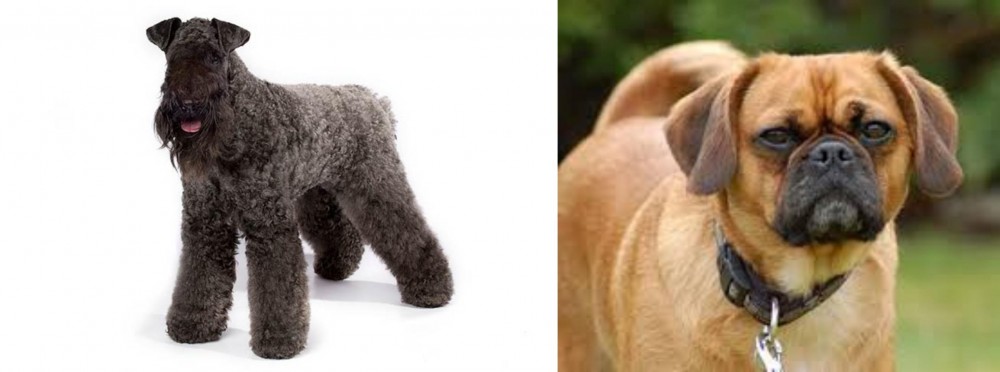 Kerry Blue Terrier is originated from Ireland but Pugalier is originated from United States. Kerry Blue Terrier may grow 16 cm / 7 inches higher than Pugalier. Kerry Blue Terrier may weigh 8 kg / 18 pounds more than Pugalier. Both Kerry Blue Terrier and Pugalier has same life span. Both Kerry Blue Terrier and Pugalier has almost same litter size. Kerry Blue Terrier requires Moderate Maintenance. But Pugalier requires Low Maintenance
Kerry Blue Terrier is originated from Ireland but Pugalier is originated from United States. Kerry Blue Terrier may grow 16 cm / 7 inches higher than Pugalier. Kerry Blue Terrier may weigh 8 kg / 18 pounds more than Pugalier. Both Kerry Blue Terrier and Pugalier has same life span. Both Kerry Blue Terrier and Pugalier has almost same litter size. Kerry Blue Terrier requires Moderate Maintenance. But Pugalier requires Low Maintenance
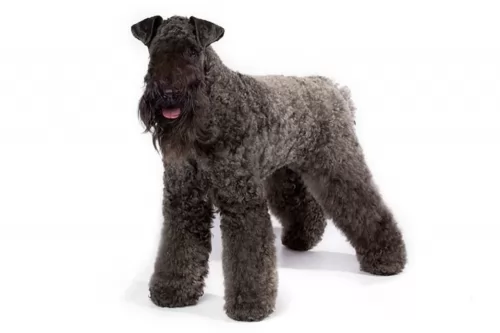 The Kerry Blue Terrier hails from Ireland, with the name of the dog coming from a place known as County Kerry, and Blue being the color of the dog's coat.
The Kerry Blue Terrier hails from Ireland, with the name of the dog coming from a place known as County Kerry, and Blue being the color of the dog's coat.
The Kerry Blue was originally bred to control rats, rabbits and otters and was actually a working dog for a host of different jobs.
It was in 1922 that the United States Kerry Blue Terrier Club was founded and recognized by the AKC in 1924.
 The Pugalier is a designer dog which dates to the 1980s and 1990s. Being a fairly new dog breed, it doesn’t have a long or detailed history.
The Pugalier is a designer dog which dates to the 1980s and 1990s. Being a fairly new dog breed, it doesn’t have a long or detailed history.
It is thought that they were first bred in the United States. There was a purpose behind the crossing of the Pug and the Cavalier King Charles Spaniel. Dog enthusiasts were looking for a dog that would have less breathing problems with a longer nose.
There are a few dog breed registries that recognize the Pugalier as a designer dog breed, one of which is the American Canine Hybrid Club.
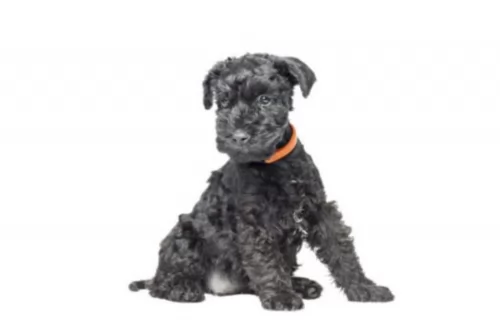 The Kerry Blue is a small dog standing at between 44 to 51cm and weighing anything between 15 and 18kg. He has dark eyes which give him that typical alert Terrier expression.
The Kerry Blue is a small dog standing at between 44 to 51cm and weighing anything between 15 and 18kg. He has dark eyes which give him that typical alert Terrier expression.
The ears are small and are carried up before flopping down. The high-set tail has always been customarily docked, giving him a compact, jaunty appearance but these days, the tail tends to be left long, curling somewhat over the back.
He has a coat which is quite wavy or curly and comes in different shades of grey or blue, while the puppies are born black, gradually becoming more blue. The dog is considered to be hypoallergenic as it doesn't shed a lot.
Kerry Blue Terriers are strong willed dogs, but with training and socialization they respond well to instructions such as sit, come, lie-down and stay. As a Terrier breed he is feisty, lively, strong-willed, stubborn, independent and impulsive. They are loyal and affectionate towards their owners and are amicable with children and pets in the home.
Training and socialization develops a balanced attitude around his human family, other animals in the home and around strangers. He is an active dog too so whether he lives in the city or the countryside, he will require a lot of exercise as he is full of life.
You can’t just put him in the backyard and forget about him. He is an intelligent, social dog who will only do well when he is counted in as a family member.
 The Pugalier looks fairly similar to a pug but with a slightly longer nose and longer ears. The tail isn’t as coifed as with the Pug, but is longer and straighter, sometimes curling slightly over the back.
The Pugalier looks fairly similar to a pug but with a slightly longer nose and longer ears. The tail isn’t as coifed as with the Pug, but is longer and straighter, sometimes curling slightly over the back.
As with any crossbreed, the dog’s appearance can vary between the two dogs. They can be small to medium sized, usually standing at between 30 and 35cm in height and weigh between 6-10kg.
Pugaliers mostly have a fairly short coat but there are some which have longer hair because of the Cavalier's influence. The coat can be an apricot color, white, brown or even tri-color - white, black & tan.
Friendly, social ad loving, the Pugalier makes a splendid pet. He will easily adapt to life in the city or the countryside and he also gets along well with children and other dogs. They can also be amusing and entertaining, while being intelligent too.
You’ll find your Pugalier easy to train as he is intelligent and then he becomes a splendid pet with training and socialization, being obedient and well mannered wherever he is.
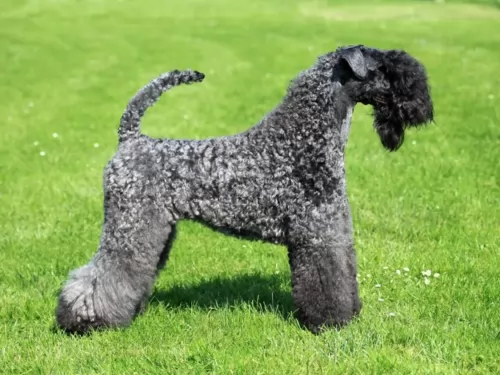 When you bring a Kerry Blue Terrier into your home and your life, you’re going to have a jaunty, lively, comical pet in your home, as he certainly has the reputation of making people laugh.
When you bring a Kerry Blue Terrier into your home and your life, you’re going to have a jaunty, lively, comical pet in your home, as he certainly has the reputation of making people laugh.
He is such an intelligent dog too and has no difficulty with learning new tricks. He takes his role of watchdog seriously too, as he loves his human family and wants to be looking out for them.
When you bring a Kerry Blue Terrier into your home, you can be assured of jolly good fun from a true canine companion.
 The Pugalier gets his characteristics from both the popular parent breeds he comes from – the Pug and the Cavalier King Charles Spaniel.
The Pugalier gets his characteristics from both the popular parent breeds he comes from – the Pug and the Cavalier King Charles Spaniel.
Both these dog breeds are immensely popular, friendly, loving and amusingly entertaining. He is an excellent dog choice for the first time dog owner.
The Pugalier is an intelligent dog breed and easy to train too. When you bring such a sweet dog into your home, you open the doors to a deep, meaningful friendship and loyalty from your canine pet.
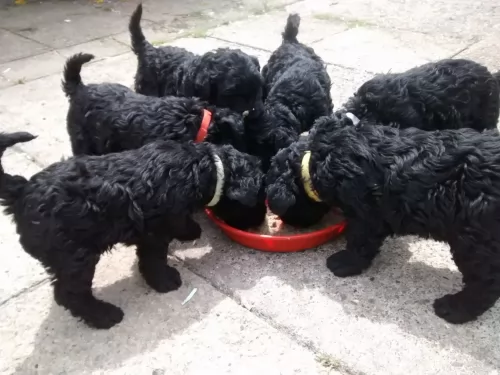 You aren’t going to be running to the vet often with your Kerry Blue as he is a healthy dog breed. However there are some common dog diseases that even the most healthiest of dogs can succumb to.
You aren’t going to be running to the vet often with your Kerry Blue as he is a healthy dog breed. However there are some common dog diseases that even the most healthiest of dogs can succumb to.
Always feed your dog the very best food there is so that he has a strong immune system that can fight off disease.
This is the inward rolling of the eyelid which can irritate the dog’s eye and even cause vision loss. Surgery can treat the problem.
Every dog can succumb to cancer. You may well find a lump or even detect a sore that won’t heal. Treatments for cancer can include medicines, chemotherapy and surgery.
This is an inherited condition to do with the hip joint. It can result in pain for your dog and even lameness. When you discover your pet no longer wants to play and he battles to get up after lying down, he will need to go to the vet. Dogs with this debilitating disease should never be bred.
 Less wrinkles and a longer snout make the Pugalier a healthier dog than the purebred Pug. The dog, when well cared for, can still reach a good age of 14 or so years.
Less wrinkles and a longer snout make the Pugalier a healthier dog than the purebred Pug. The dog, when well cared for, can still reach a good age of 14 or so years.
Eye problems can still be a problem as both the Pug and the Cavalier have protruding eyes.
Patellar Luxation is another health issue to watch for. The patella or the kneecap is dislocated and the dog will have difficulty with putting weight on the leg. Your vet may perform surgery on your dog and the prognosis is very good if arthritis hasn’t already developed.
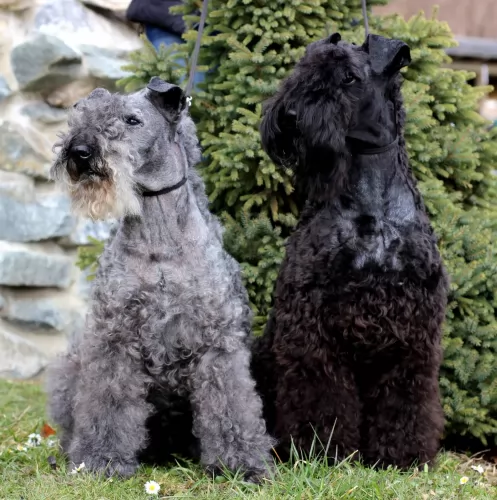 The Kerry Blue’s coat doesn’t shed a lot but it’s a curly coat that will require brushing at least twice a week. He will also require clipping and trimming if you want to keep the coat manageable.
The Kerry Blue’s coat doesn’t shed a lot but it’s a curly coat that will require brushing at least twice a week. He will also require clipping and trimming if you want to keep the coat manageable.
Nutrition is a key part of a healthy Kerry Blue Terrier and instead of just plonking down a bowl of dry kibble every day, make his mealtimes something to look forward to, more sustaining and more interesting.
Top quality kibble is good every now and then but try mixing in some cooked chicken, brown rice, pasta and vegetables occasionally as well as a little bit of raw meat. You will be rewarded with bright eyes, a wet nose, bushy, wagging tail and less trips to the vet.
Make sure there is always a supply of fresh, cool water for him.
Active and lively, your Kerry Blue will need lots of robust exercise – a daily walk as well as ball games which ensure his muscles are kept strong and toned. Not only that, this exercise is important for keeping him fit and also mentally alert.
 Your Pugalier will require daily exercise, and he will just love a walk. The Pug part of him will tell you to go slowly with exercise and to ensure it isn’t too strenuous.
Your Pugalier will require daily exercise, and he will just love a walk. The Pug part of him will tell you to go slowly with exercise and to ensure it isn’t too strenuous.
The Spaniel part of him will love a robust ball game or running backwards and forwards between two people throwing a frisbee. Watch the Pugalier during exercise and don’t allow him to get overly hot and bothered.
Pugaliers do shed hair and you will need to brush him twice a week. Check his eyes and inside his ears and make sure all is as it should be.
Trim his nails and look inside his mouth for bad teeth. Dog’s can’t tell you they’re in pain and bad teeth can cause terrible pain and a lot of health issues throughout the entire body.
Every dog needs an excellent diet if he is to ward off illness and live a long life.
There are some excellent commercially manufactured dog foods on the market so read the packaging carefully and avoid those ones with low quality ingredients like colorants, lots of preservatives and fillers.
High quality dry kibble can be made more inviting when you add in some home-cooked food twice a week. Boiled chicken, sweet potatoes, brown rice or pasta, carrots and spinach will be excellent for him – it is simple and nutritious.
Chop the food up finely and add it into the dry kibble. Also, your little pet will thrive on some raw meat occasionally too as this keeps the coat shiny and and the skin free of infections. Make sure he is never without a constant supply of fresh, cool water.